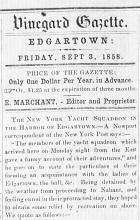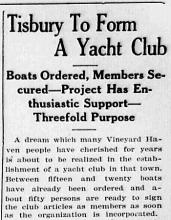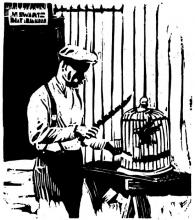Quietly and without any fanfare or other demonstration, the old schooner Alice S. Wentworth slipped out of Vineyard Haven last weekend, bound on the first leg of her long trip to Sandy Point, Me. Capt. Parker Hall, who purchased the vessel early last spring, had been waiting for a couple of young Quincy yachtsmen who had volunteered some time ago to “ship for the run,” and assist in taking the vessel to her new hailing port.
During the long wait, Captain Hall had been busy with palm, needle, and paint brush, and had accomplished a very good job of transforming the weathered topsides of the old vessel. Extensive repairs are necessary, however, and he will set about these on his arrival in Maine.
Vineyard Owned for 25 Years
The Wentworth came to Vineyard Haven during the last World War, when she was purchased by Cap’n Zeb Tilton and his partners. Curiously enough, she was owned in Maine at that time, and had been for a number of years. Built along the lines of a yacht, lofty-sparred and carrying a tremendous expanse of sail for her size, her speed and the skill of her former master in handling her, excited more and more interest as time passed and the number of schooners diminished.
Descriptive of the vessel’s agility and Cap’n Zeb’s willingness and ability to literally “play tag” with her, is the story of a certain trip to Cuttyhunk Island. Bound into the tiny harbor to dock and discharge, in a stiff northerly wind, the old schooner boiled into the inlet with her lee scuppers awash and a huge bone in her teeth, while her tall masts leaned heavily under the press of canvas as stiff as boards.
A yachtsman, tied up at one of the docks, looked up and saw, as he thought, certain destruction bearing down down upon him. “Come to! Come to!” he hailed, “You’ll smash me to kindling wood!”
Bareheaded and coatless, Cap’n Zeb twirled his wheel-spokes and shouted back as if calming a child: “Don’t you worry for one minute, cap’n there’s all of four inches to spare!”
A Part of Island Tradition
So the Wentworth, a part of Vineyard tradition, has gone down to the sea again, probably never to return to the ports which knew her for so long. Though people will unconsciously look for her in days to come and will recall with regret that her topmasts no longer rise above the sloping forelands of the Chops, they will also be glad that they were not obliged to witness her death and dissolution on some harbor beach. That much they have been spared.




 2 comments
2 comments





Comments (2)
Comments